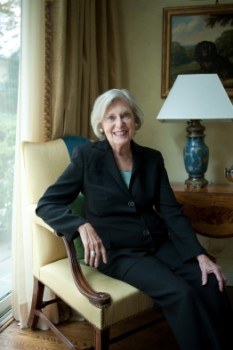
To empower and encourage women to make life choices that will preserve a healthy heart, the Hadassah Medical Center has received a ten-million dollar gift to create the Linda Joy Pollin Cardiovascular Wellness Institute.
The gift was given by Psychotherapist Irene Pollin, Founder and Chair of Sister to Sister, a 13-year-old organization devoted to preventing heart disease in women. The Institute is named for her daughter, who was born with a congenital heart condition that she bravely fought for 16 years before it took her life.
Since the founding of Sister to Sister in Washington, D.C., Pollin explains, “I have longed to find a place outside of the United States to establish a heart disease prevention program geared toward women. Given Hadassah’s 100 years of experience helping women of all backgrounds take better care of themselves, I could not think of a better way to reach out to our sisters across the globe than establishing the Linda Joy Pollin Institute at the Hadassah Medical Organization in Jerusalem. Heart disease knows no boundaries, and neither will we.”
The data collected in Israel about heart disease and the risks for women will become part of an international data base, which will be a major resource for researchers.
Dr. Donna Zfat-Zwas, Director of the Wellness Institute, already has numerous plans in the works. Two fundamental facts shape her outreach: “Cardiovascular disease differs in women”; “Much of heart disease is preventable.”
The Center, which is housed in the Hadassah Medical Center’s Heart Institute, will have a high-risk clinic, where research and gender-appropriate health education and care will be available. The clinic, Dr. Zfat-Zwas reports, will be a “one-stop shop.” The staff will include a specially trained nurse, nutritionist, fitness specialist, and mental health professional. The idea, she says, “is to think behaviorally”—to ask the question, “What interventions will fit into this individual’s lifestyle?” Once that question is answered, the person should leave the clinic with a plan. The Center will have a website as well, with text not only in Hebrew, but also in English, Russian, and Arabic.
In addition to running the clinic at Hadassah, the Center will reach out into various communities—particularly those that are underserved, such as the Haredi and Arabic populations–using an “ecological model.” Taking into consideration environmental and social factors, this model involves forming partnerships with community leaders, organizations, and the local schools, as well as working with Hadassah’s Patricia and Russell Fleischman Center for Women’s Health, the Hadassah-Hebrew University Braun School of Public Health and Community Medicine, and the Israel Heart Society. For example, Dr. Zfat-Zwas explains, it is important to ensure that the right foods are available in the supermarket; that there is a place in the locality to exercise; that there are workshops for mothers and teacher training in the school systems.
Raised in Michigan, Dr. Zfat-Zwas is a graduate of Barnard (New York) College and Harvard (Massachusetts) Medical School. The mother of four children, she is married to Jonathan Huppert, who heads the clinical psychology department at the Hebrew University. They immigrated to Israel five years ago from Philadelphia, where Dr. Zfat-Zwas was Director of the Echocardiography Laboratory at Jefferson University Hospital. “I went into cardiology because we often make very ill people better,” Dr. Zfat-Zwas notes. She explains that even in Israel, where there is advanced medicine, “we’re behind in terms of raising the consciousness of women and even many physicians about the risks of heart disease.”
“Women often blame new problems like shortness of breath on gaining weight when it’s their heart that needs attention,” Dr. Zfat-Zwas notes. “They also take longer to get to the emergency room when they are experiencing a heart attack. They are reluctant to come–embarrassed, unwilling to trouble their family members, or worried that, for sure, their complaints will be dismissed.” She cautions: “You should never be embarrassed to check on your heart.”
Dr. Zfat-Zwas adds: “We are determined to come up with solutions, to design programs that fit into the busy lives of women.”
The Linda Joy Pollin Cardiovascular Wellness Institute will be part of a larger ongoing collaboration between Sister to Sister and Hadassah, aimed at raising awareness among women around the world about heart disease and prevention. Aside from hosting educational programs locally, Hadassah will join forces to promote “Smart for the Heart,” Sister to Sister’s web-based heart health tool that provides free online health risk assessments and offers recommendations and resources for making healthier lifestyle choices that will help decrease the risk of heart disease.
